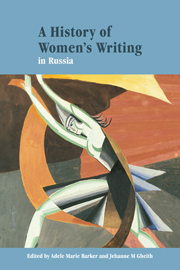Book contents
- Frontmatter
- Contents
- Notes on contributors
- Acknowledgments
- Note on transliteration
- List of abbreviations
- Introduction
- 1 Women's image in Russian medieval literature
- 2 Sappho, Corinna, and Niobe: genres and personae in Russian women's writing, 1760–1820
- 3 The inexperienced muse: Russian women and poetry in the first half of the nineteenth century
- 4 Women of the 1830s and 1850s: alternative periodizations
- 5 “A particle of our soul”: prerevolutionary autobiography by Russian women writers
- 6 The women of Russian Montparnasse (Paris, 1920–1940)
- 7 Women in Russian Symbolism: beyond the algebra of love
- 8 The eastern path of exile: Russian women's writing in China
- 9 Realist prose writers, 1881–1929
- 10 Women and gender in post-symbolist poetry and the Stalin era
- 11 Writing the female body politic (1945–1985)
- 12 In their own words? Soviet women writers and the search for self
- 13 Women's poetry since the sixties
- 14 The persistence of memory: women's prose since the sixties
- 15 Perestroika and post-soviet prose: from dazzle to dispersal
- Bibliographical guide to writers and their works
- Guide to further reading
- Index
15 - Perestroika and post-soviet prose: from dazzle to dispersal
Published online by Cambridge University Press: 22 September 2009
- Frontmatter
- Contents
- Notes on contributors
- Acknowledgments
- Note on transliteration
- List of abbreviations
- Introduction
- 1 Women's image in Russian medieval literature
- 2 Sappho, Corinna, and Niobe: genres and personae in Russian women's writing, 1760–1820
- 3 The inexperienced muse: Russian women and poetry in the first half of the nineteenth century
- 4 Women of the 1830s and 1850s: alternative periodizations
- 5 “A particle of our soul”: prerevolutionary autobiography by Russian women writers
- 6 The women of Russian Montparnasse (Paris, 1920–1940)
- 7 Women in Russian Symbolism: beyond the algebra of love
- 8 The eastern path of exile: Russian women's writing in China
- 9 Realist prose writers, 1881–1929
- 10 Women and gender in post-symbolist poetry and the Stalin era
- 11 Writing the female body politic (1945–1985)
- 12 In their own words? Soviet women writers and the search for self
- 13 Women's poetry since the sixties
- 14 The persistence of memory: women's prose since the sixties
- 15 Perestroika and post-soviet prose: from dazzle to dispersal
- Bibliographical guide to writers and their works
- Guide to further reading
- Index
Summary
“Women writers have a lot to overcome
within themselves and a lot of work to do.”
NATAL'IA IVANOVA (1986)“The aggression and naturalism saturating
‘women's prose’ are explained simply and
are rooted in the nature of a woman's soul.”
PAVEL BASINSKII (1991)“The literary establishment in Soviet Russia
was so clearly a male domain.”
SVETLANA VASILENKO (1997)“If a feminist is a woman who considers
herself no worse than a man, then I'm
unquestionably a feminist.”
Aleksandra Marinina (1998)Politics and prose
Russia's official divestment of communism vividly illustrates ideology's capacity to shape history, make mock of geographies, and reverse ostensibly sacrosanct trends and traditions. The turmoil and trauma of the dozen-odd years spanning perestroika and the post-Soviet era have reconfigured the map not only of Russia, but also of recent women's fiction. A reader versed in women's prose of the 1970s and early 1980s now contemplates a radically altered fictional landscape — within a society that currently gives short shrift to Literature and other high culture genres consecrated by the Soviet establishment. With Literature no longer a supreme category of ideological and cultural self-definition, its practitioners have forfeited status and state subsidies. They now compete for a readership with authors of pulp fiction and translations of western bestsellers in a book market driven by customer demand. Not ideological rectitude, but the muse of solvency presides over publishing, film production, recordings, and stage performance.
- Type
- Chapter
- Information
- A History of Women's Writing in Russia , pp. 297 - 312Publisher: Cambridge University PressPrint publication year: 2002
- 2
- Cited by



